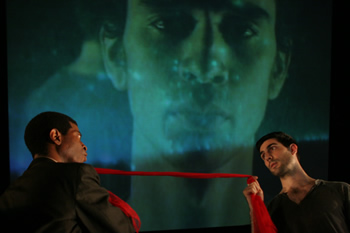HotReview.org Editor's
Picks
Shows Worth Seeing:

Philoktetes
By John Jesurun
Soho Rep
46 Walker St.
Box office: (212) 868-4444
John Jesurun’s Philoktetes is a returning ghost
of a play about a returning ghost. Originally written in 1993
for the actor Ron Vawter, who starred in it as he was dying of
AIDS, it has been subsequently directed by the author several
times in several different ways, including a 2005 Japanese production
starring a famous Noh theater actor. This Soho Rep production
is its U.S. premiere. The work clearly haunts Jesurun, which is
no surprise since one of its chief novelties is that this version
of the famous Greek title character may already be dead when the
action opens. He’s a self-described “talking corpse”
who provokes and toys with others using a remarkable logorrhea
blended from glib colloquialisms, brute profanity, and lapidary
philosophical statement. Philoktetes was a Greek general whom
the Greeks abandoned on a desolate island after he suffered a
wound that smelled bad and refused to heal. Later, when a prophecy
states that the Greeks can’t win the Trojan war without
Philoktetes’ magical bow (which once belonged to Herakles),
Odysseus and Neoptolemus (the dead Achilles’ son) are sent
to get the bow by hook or crook. Jesurun is fascinated by the
“crookery” involved in this circumstance, yet rather
than dramatize it, as Sophocles and others did, he concentrates
on what might be described as frozen moments when the bad faith
of the visitors is obvious to all and Philoktetes can let loose
with an arsenal of emotionally analytical, accusatory language.
There’s no moral comeuppance here but rather an awful, serio-comic,
cyclical misery that all the characters—being principal
agents of a predestined war—have no choice but to endure
into eternity. Jesurun has directed the work this time with actors
in plain modern street clothes sandwiched between two video-projection
surfaces: one occupying nearly the entire stage floor, the other
hanging diagonally overhead. Other than a few chairs, the video
images are the only set—splashing water, hurricane winds,
falling bombs, smoke, gently blowing trees, live video of the
actors—and they create a rich countertext concerning a world
of earthly phenomena that continues on its merry, violent way
while the characters’ purgatorial recriminations drone forever
on. The three actors—Louis Cancelmi, Will Badgett, and Jason
Lew—are all strong in the gravely serious registers Jesurun
apparently held them in, but the production could’ve used
a little clownish lightness too. In any case, the overall experience
is bracing, and the chance to see this remarkable work is rare
and shouldn’t be missed.
----------------------------------

Mauritius
By Theresa Rebeck
Biltmore Theater
261 W. 47th St.
Box office: (212) 239-6200
The first wave of reviews of Mauritius—Theresa
Rebeck’s first play on Broadway—have hammered it for
its likeness to David Mamet’s American Buffalo.
There are indeed blatant similarities, including the use of choppy,
Mametesque language, and Rebeck would have been wise to offer
some pre-opening remarks explaining her feelings (homage? antipathy?
competitiveness?). Nevertheless, I strongly urge HotReview.org
readers to see the play and judge it for themselves. In American
Buffalo, a scheme to steal a possibly valuable coin dramatizes
the way commerce confuses and poisons friendship and loyalty among
a trio of thuggish dimwits. In Mauritius, a messy struggle
between two intelligent half-sisters over what to do with a possibly
valuable, inherited stamp collection sets in motion a nuanced
story about the effects of greed, abandonment, betrayal and opportunism
on people with fatefully different self-images. I happen to be
a Mamet fan, but I’ve always hated American Buffalo,
which presents an unremittingly loathsome picture of thoroughly
loathsome people. It’s emotionally monotonous, with a tedious
and frustrating plot built entirely around entrapment, extortion
and posturing among supposed friends. Rebeck, for her part, never
dwells on the loathsome for its own sake. Her tale of scheming
and petty crime indulges in muck but also illuminates because
her characters are articulate enough to probe questions of authenticity
that Mamet merely skimmed. The struggle over the stamps is in
part a class conflict, since the sisters were brought up in different
circumstances and since Philip, the snobbish expert who must be
relied on to authenticate the stamps—played with dead-on
weaseliness by Dylan Baker—tosses off earnest speeches about
heritage and moral rectitude the way the others fire off profanities.
Before you judge Jackie, the younger sister (played by the wonderfully
pouty Alison Pill), too harshly for not contacting a lawyer, remember
Philip’s sliminess, and consider how little anyone in Jackie’s
position would expect from any professional. The first-rate cast
also includes F. Murray Abraham, Bobby Cannavale and Katie Finneran,
and the direction by Doug Hughes is cogent, swift and focused.
